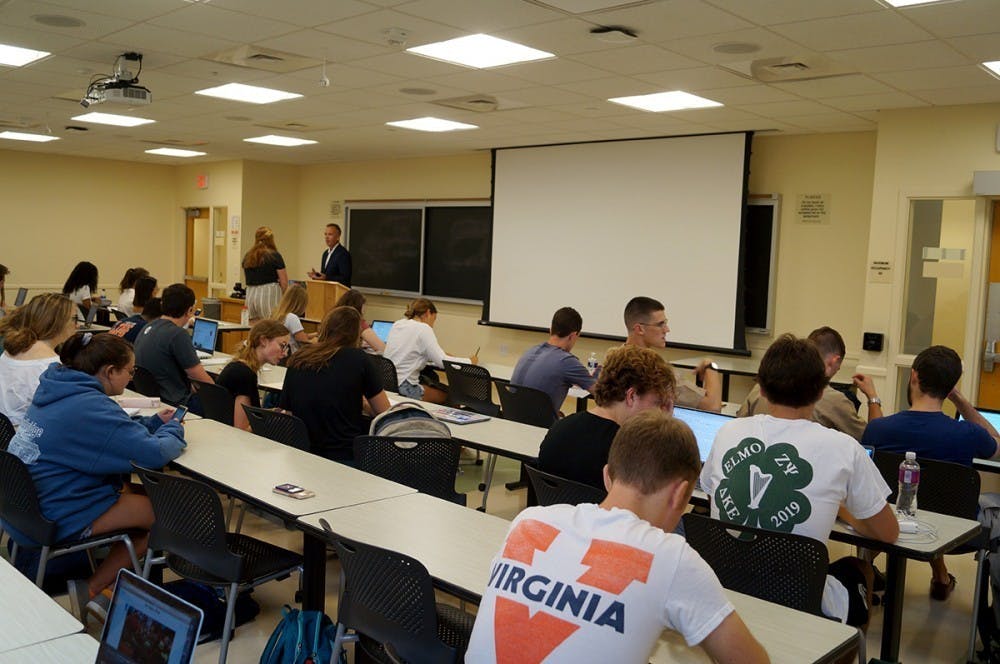The University’s status as one of the premier public schools in the country has historically attracted a distinguished faculty consisting of some of the best and brightest minds in academic fields across both undergraduate and graduate studies. These individuals greatly contribute to the sustained academic excellence for which the University has long been renowned. With that said, the divergence in both course content and difficulty that exists between professors teaching the same courses presents an unnecessary obstacle to students for mostly arbitrary reasons.
Professors at the University are given substantial independence to come up with their own personalized syllabi for their classes. In theory, this is a very good thing. Professors aren’t bound by rigid class slides or curriculums. They have the freedom to discuss topics, readings and thinkers that may be glossed over or disregarded entirely by other instructors. This means that the professor you choose may play a substantial role in the overall experience of the class. In practice, however, this often plays to the detriment of students.
It’s well known at the University that having a different professor often means taking a demonstrably different class. Comparing two classes of the same semester, in the same department, on the same subject, can often mean different homework schedules, grading policies, assessments, attendance procedures and even material. These changes are significant and often have far-reaching effects on the workload or difficulty of a given class. Currently, two students taking the same course could be incompatible as far as studying goes because their professors might have completely different timetables for material and exams.
Summer classes provide an excellent miniaturization of this phenomenon. As a result of having typically only four weeks to complete an otherwise semester-long class, the curricula for summer classes are usually greatly adjusted for timeliness. It’s not uncommon to hear of certain classes being substantially different over the summer. Often graduate students teach summer classes and have to abide by a very strict schedule to ensure students learn the requisite material in time.
Moreover, course selection is a long, involved process that often consists of cross-checking class times, professor reviews, GPA trends and required readings in order to maximize each semester at the University. The staggered nature of course registration means that some students — such as athletes and upperclassman — naturally get the first pick. As such, many students won’t have the opportunity to select professors of choice as their sections fill up more quickly, usually by merit of having higher historical GPAs and more convenient class times. Through no fault of their own, students are forced to take effectively more difficult classes due to the disparity between professors. Looking at the historical class GPAs of different professors teaching the same course, paints a grim picture.
Introductory Microeconomics, which is among the most popular courses offered at the University in terms of sheer class size, is practically a roll of the dice depending on the professor. The class GPA between 2016 and 2018, across only the Spring and Fall sections of the course, ranges from 2.78 at its lowest, to 3.38 at its highest. This reflects nearly a full letter-grade difference within sections of the same course in only the past two years. It’s also worth pointing out that this divergence exists almost entirely between different professors, rather than between multiple sections of the course taught by the same professor. The biggest GPA gap between different sections taught by the same professor in a given year, during the same time period, is just 0.21. The biggest gap between different professors of a given year is 0.46. Clearly the professor has a legitimate impact on the grade distribution, and in that sense, the University isn’t treating all students fairly.
One easy change could be to give the same assessments for every section of a course, regardless of professor. Study materials would be more universal, and there wouldn’t be fundamental differences between the classes in grade distributions since all the students would be taking the same exams with presumably the same weight or curve. Instructors would likely have to communicate on the precise format of the exams, but this would ensure students across different sections have uniform degrees of proficiency. Professors would also retain a high degree of freedom. Standardizing tests might mean restructuring the organization of material to ensure it is aligned with other instructors, but it would still allow professors to control basically every other aspect of their class organization, including their personalized presentation of course content.
Currently, the University acknowledges no distinctions between sections taught by different professors, meaning they should be basically interchangeable in terms of material. Standardizing the tests, grading policies or even basic syllabi between multiple professors of the same classes in a given semester would only further reinforce the sentiment of equality that’s clearly the ideal.
A professor sharing their expertise in a course is not the problem and making all the classes identical is not the solution. Education is fluid. Learning the same material can happen in a number of different ways. However, for the sake of student prosperity and consistency, there have to be mechanisms in place to ensure students aren’t at a disadvantage because of who their professor happens to be.
Shrey Dua is an Opinion Columnist for The Cavalier Daily. He can be reached at opinion@cavalierdaily.com.







